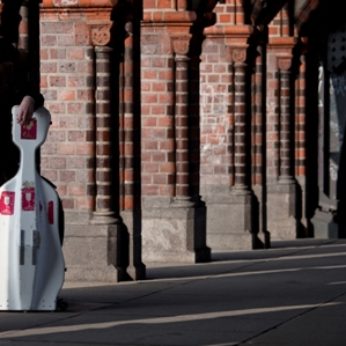Composer: Franz Schubert (b. 1797 - d. 1828)
Performance date: 09/07/2016
Venue: Bantry Library
Composition Year: 1828
Duration: 00:54:18
Recording Engineer: Richard McCullough, RTÉ lyric fm
Instrumentation: 2vn, va, 2vc
Instrumentation Category:String Quartet
Artists:
Vanbrugh Quartet (Gregory Ellis, Keith Pascoe [violins] Simon Aspell [viola] Christopher Marwood [cello]) -
[quartet]
Adrian Brendel -
[cello]

This Sonata stands at the summit. It is as though
Schubert here achieves everything he has been striving for – perfection of
form, especially the last movement; perfection of utterance, every emotion is
given its moment; and a glorious fusion of his lyrical songmaster’s voice with
his inner demons. It is a work of massive power and outstanding stature, it is
also an enormous work lasting over forty minutes but with not a note wasted.
There is a regal majesty surrounding this work that marks it out from the first
bar as one of the peaks of the piano literature.
The opening speaks of thunder, controlled majestic
power, with cascades of subservient strains dancing attendance. These attendant
ideas in triplets and chords then take over before being worked into the
restatement of the theme, a remarkable fusion so early in the movement.
Schubert is no longer content to hold back the development of his ideas until
the traditional development section. The noble second subject does not reveal
itself immediately, slipping gently into the debate before establishing itself
so forcefully that Schubert finds it necessary to cool the temperature by
recalling its earlier peacefulness before the repeat calls up the voice of
thunder again. The development section is taken over by a jaunty new idea that
marvellously explores itself before handing us back to the recapitulation. The
coda is extraordinary, no more thunder, hesitant, broken phrases are all that
is left of the main theme before the magical close is ushered in by sweeping
arpeggios.
The contrast between raw power and gentle nobility is
taken even further in the heart-stopping Andantino.
The main theme is a wistful strain of quiet melancholy over an incessant
walking accompaniment, recalling the sad wanderers of the song cycles. The key
remains doggedly in F sharp minor, the tread in the left hand goes on and on,
the wary will recognise the calm before the storm. Gradually we are led into
the dramatic central section, but nothing we have heard so far prepares us for
the wild outburst of despair that follows. This deluge of torrential scales and
shock harmonies culminates in terrible silences and terror-filled stabbing
chords. Gradually calm is restored and the main theme returns, but utterly
changed, shorn of its innocence and melancholy, bearing its visionary burden of
horror.
The Scherzo needs to be bright and airy after such a
vision but at times one cannot but feel that Schubert is not convinced by this
attempt at cheerfulness, a feeling confirmed by the solemnity of the Trio.
The Finale is an immense sonata-rondo of extraordinary
lyricism. The themes sing with a beauty that verges on the heartbreaking, they
sing and sing, long spinning cantabile lines, seemingly untroubled by any
cares, as if his only purpose is to melt our hearts with melody. And he had
this incredible confidence in his power – the music just pours out and it seems
as if nothing can stop him, we are held, helplessly mesmerised as the notes
flow past. Eventually it has to end, long pauses warn us the coda is imminent
and it arrives in a tempestuous presto, a world flashes by and in a final
masterstroke we are brought full circle back to the voice of thunder that
opened the sonata.
Copyright © 2025 West Cork Music. All rights reserved.
Designed and developed by Matrix Internet